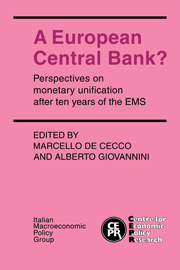Book contents
- Frontmatter
- Contents
- List of figures
- List of tables
- Preface
- List of conference participants
- 1 Does Europe need its own central bank?
- 2 Monetary policy, capital controls and seigniorage in an open economy
- 3 Seigniorage in Europe
- 4 Factor mobility, uncertainty and exchange rate regimes
- 5 Management of a common currency
- 6 The tastes of European central bankers
- 7 The costs and benefits of a European currency
- 8 The monetary unification process in nineteenth-century Germany: relevance and lessons for Europe today
- 9 The establishment of a central bank: Italy in the nineteenth century
- 10 The founding of the Fed and the destabilization of the post-1914 US economy
- 11 Panel discussion on the prospects for a European Central Bank
- Index
1 - Does Europe need its own central bank?
Published online by Cambridge University Press: 05 February 2012
- Frontmatter
- Contents
- List of figures
- List of tables
- Preface
- List of conference participants
- 1 Does Europe need its own central bank?
- 2 Monetary policy, capital controls and seigniorage in an open economy
- 3 Seigniorage in Europe
- 4 Factor mobility, uncertainty and exchange rate regimes
- 5 Management of a common currency
- 6 The tastes of European central bankers
- 7 The costs and benefits of a European currency
- 8 The monetary unification process in nineteenth-century Germany: relevance and lessons for Europe today
- 9 The establishment of a central bank: Italy in the nineteenth century
- 10 The founding of the Fed and the destabilization of the post-1914 US economy
- 11 Panel discussion on the prospects for a European Central Bank
- Index
Summary
Introduction
The initiatives to discuss the establishment of a centralized monetary authority in Europe, coming from government officials, have caught observers by surprise. The European Monetary System (EMS) has proved to the whole world to be a viable arrangement, and has been able to withstand the sizeable international financial shocks of the early 1980s: an immediate threat to the EMS is thus not evident. These initiatives, however, should all the more be applauded, since they signal the concern of governments with the fast evolution of the European economies and capital markets. The renewed debate on a European central bank reopens the questions of whether current monetary institutions will be obsolete and incapable of functioning in the face of the seemingly unstoppable trend towards market integration, and of the viability of new institutional arrangements among central banks.
In the significant body of research on the EMS there is little concern with the issue of a European central bank. Existing work concentrates on interpreting EMS experience, and evaluating the performance of that system. Hence this book represents a first attempt at analysing the various aspects of the problem of a centralized European monetary authority. While by no means exhaustive, this book brings the perspectives of both economic analysis and economic history to bear on this issue. The purpose of this essay is to describe the background to the question of monetary unification, the arguments according to which Europe would need its own central bank, and the problems of designing viable institutional arrangements, in the light of historical experience.
- Type
- Chapter
- Information
- A European Central Bank?Perspectives on Monetary Unification after Ten Years of the EMS, pp. 1 - 12Publisher: Cambridge University PressPrint publication year: 1989



